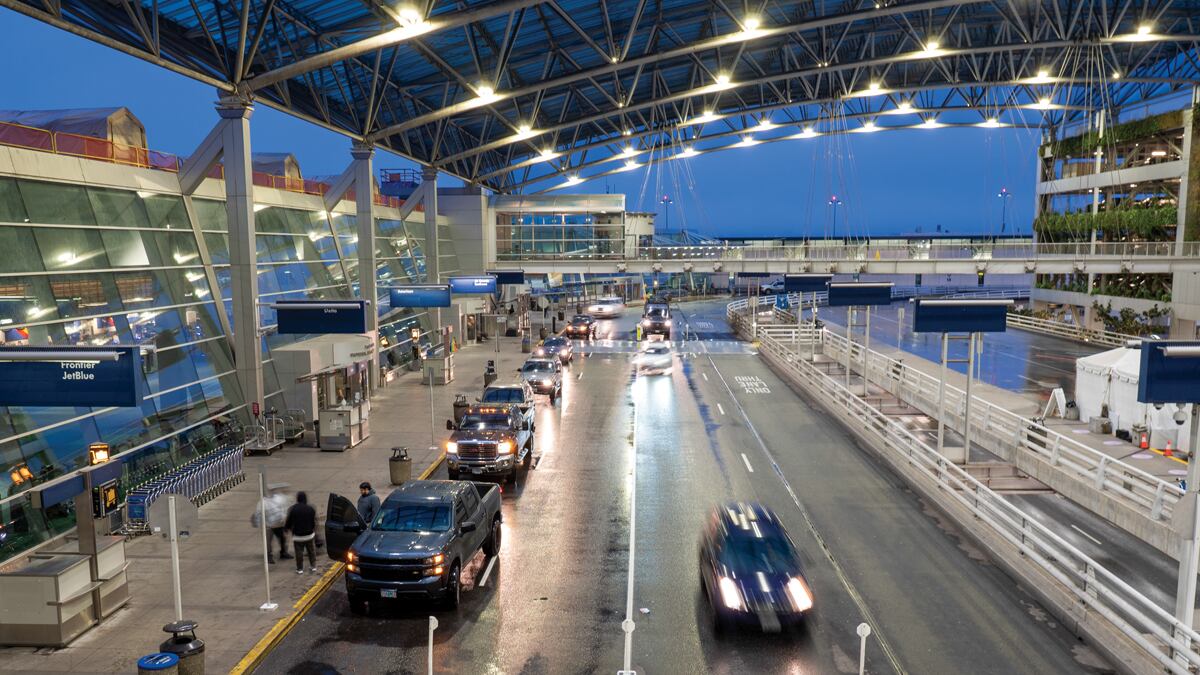On Nov. 24, an Alaska Airlines Airbus A320 bound from Portland to San Francisco made an emergency return to Portland International Airport after an engine failed.
Waiting on the ground: a team from the Airport Fire Fighters Association, whose highly trained members respond every time a plane makes an unscheduled landing at PDX or is otherwise in distress. The landing went smoothly.
But the firefighters faced staffing shortages that day—because more than a third of the union’s members refused to get vaccinated for COVID-19.
Those firefighters are now embroiled in a legal dispute that could have implications for other vaccine-hesitant health care workers and for operations at the airport during the holiday travel season.
On Dec. 6, lawyers for the union and the Port of Portland, which owns PDX, presented their final arguments to the state’s Employment Relations Board. At issue: whether the port must make accommodations for firefighters who seek religious exemptions from Oregon’s vaccine mandate.
The labor crunch is largely resolved: Just four firefighters decided they would rather lose their jobs than get the jab. But the legal fight continues—and shows how much Portland’s daily life hinges on the health choices of a handful of people.
The airport is a busy place. In normal times, PDX serves more than 50,000 passengers a day. (Due to the pandemic, passenger traffic was down 28% in October from 2019 levels.) Another 10,000 employees work at the airport. If PDX were a city, it would be the eighth largest in Oregon, slightly ahead of Springfield and Corvallis.
As is the case with Portland Fire & Rescue firefighters, the firefighters at PDX mostly respond to medical calls. (In 2019, the last full year before the pandemic, port figures show they handled 2,586 calls.)
But there are a couple of key differences: Unlike Portland Fire & Rescue, for example, which has 31 stations, PDX has only one. Given that firefighters work in close proximity to each other, a COVID outbreak could quickly spread through that single station. Second, firefighters at the airport must be certified by the Federal Aviation Administration to respond to airplane emergencies.
Kama Simonds, a port spokeswoman, says a COVID outbreak among firefighters could have far-reaching consequences. “Below a certain threshold, the FAA wouldn’t allow jets to land,” Simonds says. “That would shut down the airport.”
On Aug. 25, the Oregon Health Authority issued an order directing all health care workers, which include firefighters, to get vaccinated or seek a medical or religious exemption. The agency set an Oct. 18 deadline for compliance.
At PDX, 14 of the 41 members of the airport firefighters’ union refused, citing religious objections.
They instead asked for accommodations, including “wearing masks, appropriate personal protective equipment on medical calls, social distancing, and enhanced hygiene standards.” (Much of the negotiation is documented in an unfair labor practice complaint the union eventually filed with the Employment Relations Board.)
The port said it would approve religious exemptions—but such firefighters wouldn’t be allowed to come to work.
In early October, the port notified the 14 firefighters they needed to come in for in-person meetings—without union representation. On Oct. 15, the last business day before the vaccination deadline, the port told the 14 there would be no accommodations.
The port explained its thinking in an email to union leaders.
“Because the Port has just one fire station, there is no ability to relocate you to another station should an outbreak occur, nor could the Port receive airfield responses from elsewhere,” the Oct. 15 email said. “The business interruption risk is great. If the Port Fire Department had a COVID outbreak and was unable to operate, PDX would not be able to operate, which would have a significant negative impact not only on the Port but also on the multistate region.”
Instead, the firefighters were placed on leave and told that if they didn’t get vaccinated by Nov. 30, they’d be laid off.
On Oct. 19, the day after the vaccination deadline, International Association of Fire Fighters Local 43, which represents both city and airport firefighters, filed the unfair labor practice complaint.
In the complaint, the firefighters alleged the port had violated a memorandum of understanding on COVID and said it “engaged in a series of unlawful acts all related to its short-sighted, counterproductive, and improper implementation of the vaccine mandate.”
The union said its members were being treated differently from other Oregon workers subject to the vaccine mandate, because the port refused to accommodate religious exemption requests that “most, if not all, fire departments throughout the state of Oregon have provided in similar circumstances.”
Alan Ferschweiler, president of the union, says he believes the port took a tougher stance than cities and towns all over Oregon, many of which have just one fire station.
“The port was the only jurisdiction that took this hard a line around the state,” Ferschweiler says. “They dug in their heels and they’ve even tried to hire firefighters from other bureaus to train up.” (Just two city of Portland firefighters got laid off for refusing vaccinations.)
The union accused the port of creating a “staffing crisis.”
As the stalemate played out, some firefighters decided their need for a job outstripped their religious principles: Nine got vaccinated. One of the 14 is out on medical leave, Simonds says, while four held fast and got laid off Dec. 1.
Jason Weyand, the attorney representing the firefighters, says the dispute is not political, but rather a matter of whether the port acted in good faith in communicating with the union. Weyand says the disagreement is simply an effort to “protect the rights of its members and enforce the agreement it had with the port regarding the mandate.”
Simonds says the port communicated clearly with firefighters on vaccines. “We worked through a process with the union on this,” she says.
The Employment Relations Board is expected to rule on the dispute in the next month.
